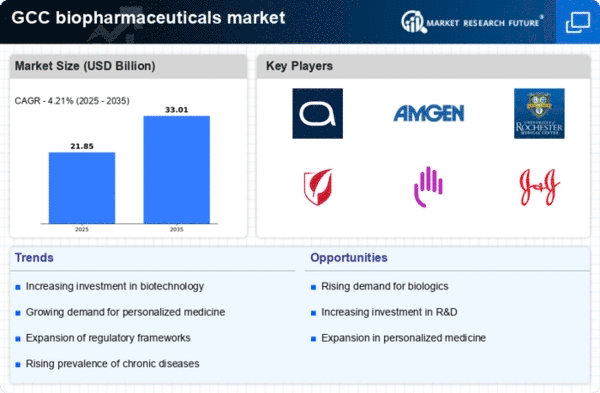Increasing Demand for Biologics
The biopharmaceuticals market is experiencing a notable surge in demand for biologics, driven by their efficacy in treating complex diseases. In the GCC region, the market for biologics is projected to grow at a CAGR of approximately 8% over the next five years. This growth is attributed to the rising prevalence of chronic diseases and the increasing awareness of biologics among healthcare professionals and patients. The GCC governments are also investing in healthcare infrastructure, which further supports the adoption of biologics. As a result, the biopharmaceuticals market is likely to witness a significant shift towards biologics, enhancing treatment options and improving patient outcomes.
Government Initiatives and Funding
Government initiatives play a crucial role in shaping the biopharmaceuticals market in the GCC. Various national health policies are being implemented to promote research and development in biopharmaceuticals. For instance, the GCC governments are allocating substantial funding to support local biopharmaceutical companies, which is expected to reach $500 million by 2026. These initiatives aim to foster innovation and reduce dependency on imported drugs. Furthermore, regulatory frameworks are being streamlined to facilitate faster approvals for biopharmaceutical products. Consequently, these government efforts are likely to create a conducive environment for the growth of the biopharmaceuticals market.
Growing Focus on Preventive Healthcare
There is a growing emphasis on preventive healthcare within the GCC, which is influencing the biopharmaceuticals market. This shift is characterized by increased public awareness regarding health and wellness, leading to a demand for preventive therapies and vaccines. The GCC governments are promoting health education and preventive measures, which is expected to drive the market for biopharmaceuticals that focus on prevention. As a result, the biopharmaceuticals market is likely to expand, with more products being developed to address preventive healthcare needs, thereby improving overall public health outcomes.
Advancements in Biomanufacturing Technologies
Advancements in biomanufacturing technologies are significantly impacting the biopharmaceuticals market. The introduction of innovative production methods, such as continuous manufacturing and single-use technologies, is enhancing efficiency and reducing costs. In the GCC, these advancements are expected to lower the production costs of biopharmaceuticals by approximately 15% over the next few years. This reduction in costs may lead to more affordable biopharmaceutical products, increasing accessibility for patients. Consequently, the biopharmaceuticals market is poised for growth as manufacturers adopt these technologies to meet rising demand.
Rising Investment in Healthcare Infrastructure
The biopharmaceuticals market is benefiting from the rising investment in healthcare infrastructure across the GCC. With healthcare expenditure projected to increase by 5% annually, there is a clear focus on enhancing facilities and services. This investment is not only aimed at improving patient care but also at supporting the development and distribution of biopharmaceutical products. Enhanced infrastructure enables better clinical trials, manufacturing capabilities, and distribution networks, which are essential for the biopharmaceuticals market. As a result, the region is likely to see a more robust biopharmaceutical ecosystem, fostering innovation and accessibility.
















